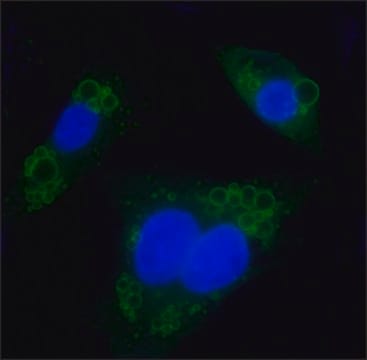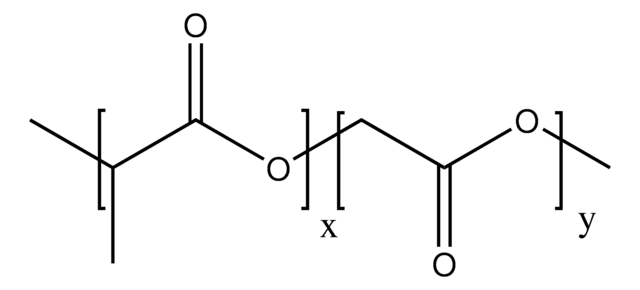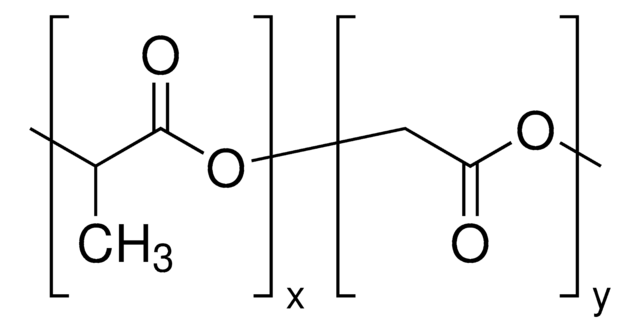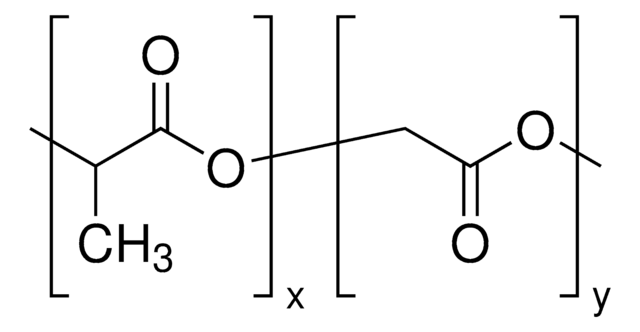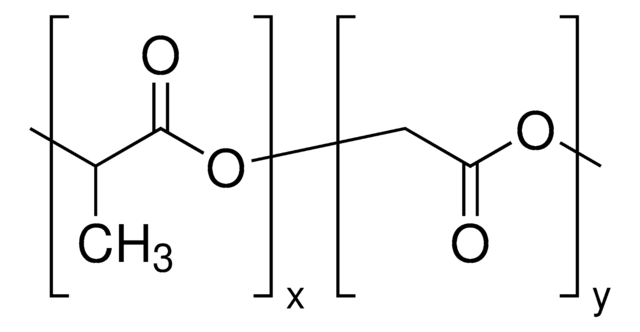P2066
Poly(D,L-lactide-co-glycolide)
lactide:glycolide 65:35, Mw 40,000-75,000
Synonyme(s) :
Lactel® B6001-1, PLGA
About This Item
Produits recommandés
Forme
pellets
Niveau de qualité
Ratio alimentaire
lactide:glycolide 65:35
Poids mol.
Mw 40,000-75,000
Température de stockage
−20°C
Chaîne SMILES
OCC(O)=O.CC(O)C(O)=O
Vous recherchez des produits similaires ? Visite Guide de comparaison des produits
Catégories apparentées
Application
- Inhaled Macrophage Apoptotic Bodies-Engineered Microparticle Enabling Construction of Pro-Regenerative Microenvironment to Fight Hypoxic Lung Injury in Mice.: This study demonstrates the use of Poly(ᴅ,ʟ-lactide-co-glycolide) (PLGA) in engineering microparticles that promote lung tissue regeneration in hypoxic conditions, highlighting its potential in developing advanced therapeutic strategies for respiratory injuries (Liu et al., 2024).
- Engineered nanoparticles promote cardiac tropism of AAV vectors.: The research explores the role of PLGA nanoparticles in enhancing the targeting efficiency of AAV vectors to cardiac tissues, showcasing its application in gene therapy and cardiovascular disease treatment (Switala et al., 2024).
- Drug-loaded adhesive microparticles for biofilm prevention on oral surfaces.: This article reports the development of drug-loaded PLGA microparticles designed to prevent biofilm formation on oral surfaces, demonstrating the polymer′s utility in dental applications and biofilm-associated infections (Oh et al., 2024).
- Dual-layer conduit containing VEGF-A - Transfected Schwann cells promotes peripheral nerve regeneration via angiogenesis.: PLGA-based dual-layer conduits are utilized to support nerve regeneration by enhancing angiogenesis, indicating its importance in neuroregenerative medicine and peripheral nerve injury treatments (Huang et al., 2024).
- Application of Doxorubicin-loaded PLGA nanoparticles targeting both tumor cells and cancer-associated fibroblasts on 3D human skin equivalents mimicking melanoma and cutaneous squamous cell carcinoma.: The study highlights the dual-targeting capability of PLGA nanoparticles in delivering chemotherapy drugs to both tumor cells and the surrounding supportive stroma, emphasizing its role in advanced cancer therapies (He et al., 2024).
Caractéristiques et avantages
Forme physique
Informations légales
Code de la classe de stockage
11 - Combustible Solids
Classe de danger pour l'eau (WGK)
WGK 3
Point d'éclair (°F)
Not applicable
Point d'éclair (°C)
Not applicable
Équipement de protection individuelle
Eyeshields, Gloves, type N95 (US)
Certificats d'analyse (COA)
Recherchez un Certificats d'analyse (COA) en saisissant le numéro de lot du produit. Les numéros de lot figurent sur l'étiquette du produit après les mots "Lot" ou "Batch".
Déjà en possession de ce produit ?
Retrouvez la documentation relative aux produits que vous avez récemment achetés dans la Bibliothèque de documents.
Les clients ont également consulté
Articles
Innovations in polymer technology have had a significant impact on the advancement of novel drug delivery systems.
Protocoles
Preparation for biodegradable nanoparticles and their use in transfection protocols .
Preparation for biodegradable nanoparticles and their use in transfection protocols .
Preparation for biodegradable nanoparticles and their use in transfection protocols .
Preparation for biodegradable nanoparticles and their use in transfection protocols .
Notre équipe de scientifiques dispose d'une expérience dans tous les secteurs de la recherche, notamment en sciences de la vie, science des matériaux, synthèse chimique, chromatographie, analyse et dans de nombreux autres domaines..
Contacter notre Service technique


